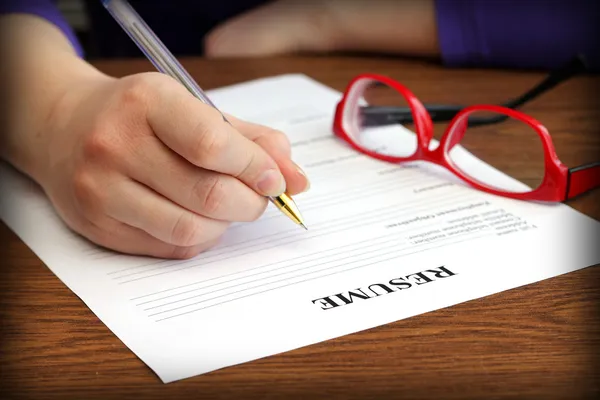Uncategorized
Let’s “Chat”: Should you use ChatGPT to write your resume?
Quick! Lightning Round question: In 10 seconds or less, can you tell me which of these resumes was written by a bot?
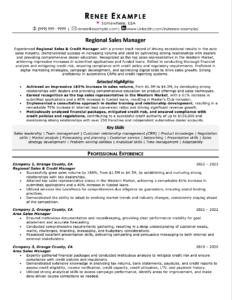
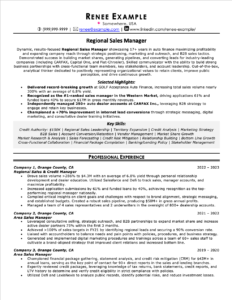
Now for a fun fact: Did you know studies show that the average hiring manager or recruiter only looks at your resume for approximately 7 seconds upon initial review? If that’s the case, does it really matter who (or what) is writing your application materials?
I’ll give you the Lightning Round answer shortly, but first, we need to have a chat – and not via a bot.
The rise in popularity and efficacy of artificial intelligence (AI) has made a host of day-to-day activities more manageable; we can all appreciate how simple tasks like opening your phone or responding to a text have been reduced to a simple look or single tap on your smart phone. Although its accessibility and aptitude are continually increasing, you may want to think twice before delegating your more critical needs to AI.
In this article, we will cover both sides of this debate, including:
The pros
- Inexpensive
- Accessible
- Time-Efficient
And, the cons
- Inaccurate or Incomplete Data
- Lack of Human Personality
- Ethical and Inauthenticity Implications
(P)ro-Bot
There are certainly positives to letting ChatGPT write your resume for you – perhaps the most obvious is that at the time of this blog, it’s free to use. Giving your raw data to the chatbot is an incredibly fast and cheap way to have a rudimentary resume packaged up and ready to be popped into an ATS-compliant format within a few minutes. And, speaking of ATS, it should be noted that at face-value, using ChatGPT to write your resume may be a semi-reliable way to get through ATS scanners, as they both utilize AI algorithms to analyze information.
However, once you get past the initial benefits of efficiency and robot camaraderie, the advantages of utilizing AI for your resume steeply decline.
Thinking Outside the Chat Box
The most glaring reason an AI-generated resume won’t be the most effective choice for your job search journey is the simple fact that it can only work from the data it has available. In addition to the raw materials provided (like your resume and desired role description), ChatGPT pulls information from other parts of the information to build out its responses. However, there’s no way to control or verify where the source of that data, meaning you may end up with inaccuracies due to outdated or misinterpreted material insights.
Additionally, ChatGPT doesn’t have critical thinking skills, meaning if you accidentally omitted or incorrectly conveyed your own information, it doesn’t have the deductive reasoning capabilities to identify, question, and correct this for you. Ultimately, this can result in an inaccurate or incomplete portrayal of your skills and experiences as they relate to your next career goal.
Human Nature
Another downside to using AI to write your resume is the lack of “humanness” in the document (a shocking revelation, I’m sure!). More specifically, in addition to the output not utilizing human speech patterns, it also won’t reflect any of your individual personality. Resumes should tell your professional story and showcase your biggest wins within the context of your career goals, so it’s critical that you retain some of your personal flair throughout!
In the same vein, a ChatGPT-curated resume will be, at best, a generic document compiled from information that’s already accessible to the system. This is particularly problematic if you’re seeking a vertical move or a transition to a new career field, as AI doesn’t have the discernment or experience to highlight your transferrable skills in a way that paints as the sparkling candidate you are; instead, you’ll essentially end up with is a general set of skills on paper. Remember, you only have a handful of seconds to make a great impression with your resume — don’t risk the first (or only) tidbits the recruiter or hiring manager sees being irrelevant or uninspiring to your desired job.
(A)pplication (I)nvestigation
But, the most important consideration in the decision to chat with bots about your next big move, is this: due to the popularity of ChatGPT, many employers now utilize natural language processing (NLP) tools to recognize text patterns generated by AI. This means that not only can they tell that you used AI to write your resume, but you’ll also be faced with the ethical and authenticity concerns associated with doing so.
With all of this in mind, let’s revisit the example from above.
And now, the answer you’ve all been waiting for…
Here is a bit of context on how each of these resumes were created. Here is the original resume material sent to me by a client (personal information has been changed or redacted for security purposes).
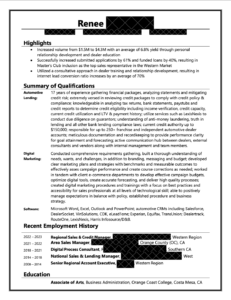
I gave ChatGPT the full resume with separate prompts to write a four-sentence professional summary, three key highlights, 12 required skills, and bulleted professional experiences, all within the parameters of targeting a position as a Regional Sales Manager in the automotive industry. I then took all of that information and put it into one of my ATS-compatible formats and filled in any additional information (like education or technical skills).
Here is the version generated by the chatbot:

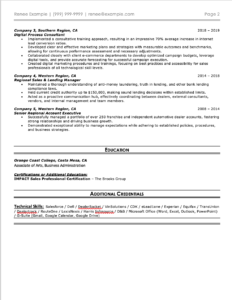
Using the same information from the client (the resume and goal of attaining a Regional Automotive Sales Management role), here is the version I wrote:

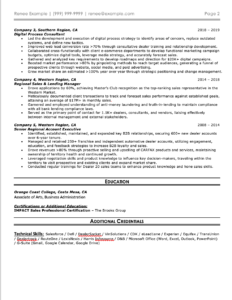
In comparing the two, what do you notice on first glance? Immediately, you can see that while there’s additional text in the highlights portion of the bot version, there isn’t as much information on the second page of the document. You may also notice that the key skills in the AI document are rather generic and not tailored to the client’s specific experiences or achievements.
A more detailed review reveals additional issues with the ChatGPT version. For example, I was able to create personalized, keyword-optimized content by utilizing my knowledge of the goal position and collaborating with the client to highlight big wins in those areas, whereas the bot had to be asked to generate additional generic content. Did you clock the inconsistencies in the metrics used between the “Highlights” and “Professional Experience” sections in the bot version (one says “186%” and the other “183%”)? This isn’t to say writer errors can’t still happen (after all, we are only human!), but it is important to note that a professional writer will be looking out for discrepancies like this to ensure your success.
Key Takeaways
While using AI is generally the faster and cheaper option, it’s my sincere hope that each of you is able to cultivate the job search you truly deserve by investing in your future. You have work history, unique skills, and a personality that deserves to be reflected in your documents – you’re so much more than words on paper.
If you’re interested in having your resume rewritten by a real-life person for your next job opportunity, free to schedule a consultation (for free!) where we can go over your current materials, experience, and goals together! You can also review my offerings for everything you need for your job search at www.myimprovedresume.com.


